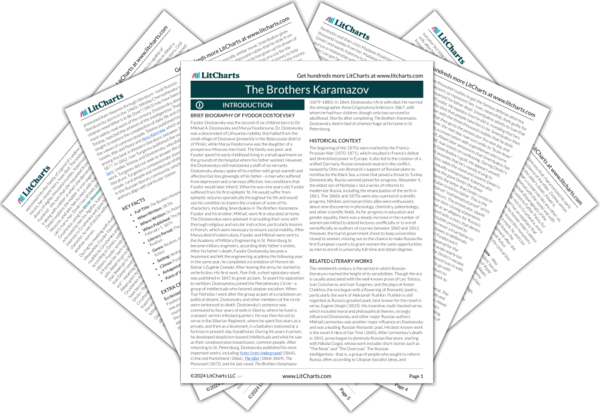Ippolit Kirillovich Quotes in The Brothers Karamazov
“Gentlemen of the jury,” the prosecutor began, “the present case has resounded throughout Russia. But what, one might think, is so surprising, what is so especially horrifying about it? For us, for us especially? We’re so used to all that! And here is the real horror, that such dark affairs have almost ceased to horrify us! It is this, and not the isolated crime of one individual or another, that should horrify us: that we are so used to it. Where lie the reasons for our indifference, our lukewarm attitude towards such affairs, such signs of the times, which prophesy for us an unenviable future? In our cynicism, in an early exhaustion of mind and imagination in our society, so young and yet so prematurely decrepit? In our moral principles, shattered to their foundations, or, finally, in the fact that we, perhaps, are not even possessed of such moral principles at all?”

Unlock explanations and citation info for this and every other The Brothers Karamazov quote.
Plus so much more...
Get LitCharts A+“For now we are either horrified or pretend that we are horrified, while, on the contrary, relishing the spectacle, like lovers of strong, eccentric sensations that stir our cynical and lazy idleness, or, finally, like little children waving the frightening ghosts away, and hiding our heads under the pillow until the frightening vision is gone, so as to forget it immediately afterwards in games and merriment. But should not we, too, some day begin to live soberly and thoughtfully; should not we, too, take a look at ourselves as a society; should not we, too, understand at least something of our social duty, or at least begin to understand? A great writer of the previous epoch, in the finale of the greatest of his works, personifying all of Russia as a bold Russian troika galloping towards an unknown goal, exclaims: ‘Ah, troika, bird-troika, who invented you!—and in proud rapture adds that all nations respectfully stand aside for this troika galloping by at breakneck speed.”

Ippolit Kirillovich Quotes in The Brothers Karamazov
“Gentlemen of the jury,” the prosecutor began, “the present case has resounded throughout Russia. But what, one might think, is so surprising, what is so especially horrifying about it? For us, for us especially? We’re so used to all that! And here is the real horror, that such dark affairs have almost ceased to horrify us! It is this, and not the isolated crime of one individual or another, that should horrify us: that we are so used to it. Where lie the reasons for our indifference, our lukewarm attitude towards such affairs, such signs of the times, which prophesy for us an unenviable future? In our cynicism, in an early exhaustion of mind and imagination in our society, so young and yet so prematurely decrepit? In our moral principles, shattered to their foundations, or, finally, in the fact that we, perhaps, are not even possessed of such moral principles at all?”

Unlock explanations and citation info for this and every other The Brothers Karamazov quote.
Plus so much more...
Get LitCharts A+“For now we are either horrified or pretend that we are horrified, while, on the contrary, relishing the spectacle, like lovers of strong, eccentric sensations that stir our cynical and lazy idleness, or, finally, like little children waving the frightening ghosts away, and hiding our heads under the pillow until the frightening vision is gone, so as to forget it immediately afterwards in games and merriment. But should not we, too, some day begin to live soberly and thoughtfully; should not we, too, take a look at ourselves as a society; should not we, too, understand at least something of our social duty, or at least begin to understand? A great writer of the previous epoch, in the finale of the greatest of his works, personifying all of Russia as a bold Russian troika galloping towards an unknown goal, exclaims: ‘Ah, troika, bird-troika, who invented you!—and in proud rapture adds that all nations respectfully stand aside for this troika galloping by at breakneck speed.”











